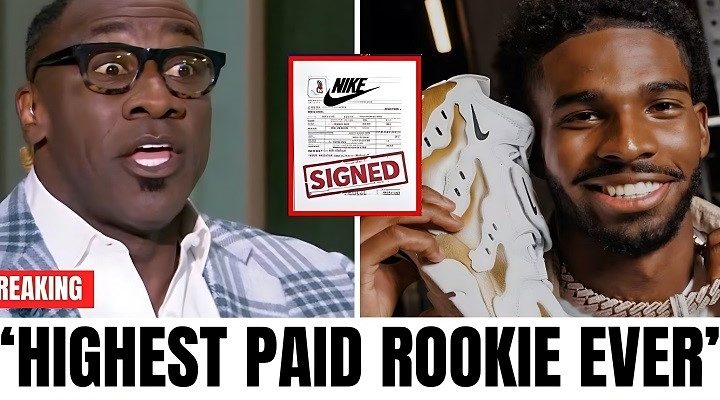NFL Executives in Crisis After Nike Signs Shedeur Sanders as the Highest Paid Rookie in History
In a move that has sent shockwaves throughout the sports world, Nike has made history by signing Shedeur Sanders, the highly anticipated rookie quarterback, to a groundbreaking endorsement deal. The deal, reported to be the largest for any rookie athlete in history, has caused an unprecedented stir among NFL executives. This seismic shift in how athletes are valued has raised a series of questions, not only about the future of athlete endorsements but also about the changing dynamics within professional sports.
A Game-Changing Deal
Nike’s deal with Shedeur Sanders has redefined the expectations for athlete sponsorships, particularly in the NFL. The company has long been a dominant force in the sports apparel industry, known for its high-profile endorsement deals with legendary athletes like Michael Jordan, LeBron James, and Serena Williams. However, this recent move to secure Sanders, a rookie who has yet to take his first official snap in the NFL, marks a bold and strategic shift.

Shedeur Sanders, the son of NFL Hall of Famer and current Colorado Buffaloes head coach Deion Sanders, has generated a tremendous amount of buzz over the past few years. Known for his impressive college career at Jackson State University and his current role as quarterback at the University of Colorado, Sanders has quickly become one of the most talked-about young athletes in the world. With his combination of skill, charisma, and marketability, it’s no surprise that Nike saw him as the future face of the NFL.
The details of the deal are yet to be fully disclosed, but sources close to the negotiation confirm that it surpasses all previous rookie endorsement contracts. The contract eclipses the deals previously held by players like Patrick Mahomes and Trevor Lawrence, signaling a shift in how athletes are valued and marketed before they even set foot on an NFL field.
The Ripple Effect on NFL Executives
The reaction to Nike’s monumental decision has been swift, with NFL executives expressing both shock and concern. For years, the NFL has had its own carefully crafted structure for rookie contracts, many of which come with strict salary caps and guidelines. These deals were designed to ensure that high-profile rookies didn’t instantly become bigger earners than seasoned veterans, maintaining the financial hierarchy of the league.
However, with Nike’s decision to offer Sanders a record-breaking deal, these traditional structures are being challenged. Executives across the NFL are now questioning whether this landmark agreement could lead to a paradigm shift in how sponsorships are approached in the future. The deal is not just a financial one; it’s a statement of intent from Nike to reshape the marketing landscape of professional sports.
The core of the executives’ crisis stems from the uncertainty this deal creates in terms of how young, unproven talent is compensated and how such deals affect the collective bargaining process. Many fear that this could lead to a scenario where rookies, regardless of their professional experience, could begin to overshadow established players in terms of financial worth. With the NFL’s salary cap structure already being a point of contention, the rise of rookie endorsement deals could create a widening gap between younger players and seasoned veterans.
The Changing Landscape of Athlete Endorsements
Nike’s strategic decision to sign Shedeur Sanders as the highest-paid rookie in history highlights the evolving nature of athlete endorsements. Traditionally, sponsorship deals were reserved for athletes who had already proven themselves on the field. Rookie deals, while lucrative, were never in the stratosphere of established stars. However, the sheer magnitude of Sanders’ deal demonstrates a shift in how companies approach athlete endorsements.
In today’s digital age, an athlete’s value isn’t solely determined by their on-field performance. Social media, personal branding, and marketability play an increasingly pivotal role in negotiations. Sanders, with his charismatic personality, strong social media presence, and connection to Deion Sanders, is a prime example of the new breed of athletes who transcend traditional sports marketing. This deal could be the beginning of a new wave of athlete endorsements where social media influence and marketability are just as important as on-field accomplishments.
Sanders’ massive deal with Nike could set a new precedent for future rookies, as brands may seek to sign athletes who have the potential to generate buzz before they even play a professional game. The line between athlete and influencer is becoming increasingly blurred, with companies now investing in athletes not just for their skill, but for their ability to engage fans, create content, and promote products in ways that transcend traditional advertising methods.
The Role of Deion Sanders
While Shedeur Sanders has certainly earned his spot in the limelight, the role of his father, Deion Sanders, cannot be understated. The elder Sanders has been a central figure in this equation, both as a Hall of Fame player and as a coach with a larger-than-life personality. Deion Sanders has been a constant source of media attention, and his coaching career, which has already elevated the University of Colorado football program, has brought even more attention to his son’s already illustrious career.
As a coach, Deion Sanders has proven to be a master at marketing and personal branding. His ability to garner attention, both for his team and for individual players, has been a key factor in Shedeur’s rise to prominence. This partnership with Nike may very well be seen as an extension of the Sanders brand—a dynamic father-son duo that represents both athletic excellence and the power of influence in today’s sports world.
Nike’s decision to back Shedeur Sanders is also a reflection of the brand’s confidence in the Sanders family as a whole. Deion’s influence has been felt not only in the locker room but in the boardroom as well, as his strong presence and ability to engage the media have undoubtedly played a role in making Shedeur an even more attractive figure for endorsements.
The Future of NFL Rookie Endorsements
The NFL is entering uncharted territory with Nike’s deal with Shedeur Sanders. As the industry continues to evolve, it’s likely that other brands will follow suit and begin offering similar deals to high-profile rookies, especially those with strong social media presences and marketability. This could fundamentally alter the way rookie contracts are structured and create a new normal for young athletes entering the league.
For NFL executives, this creates both opportunities and challenges. On one hand, there’s the possibility of increased revenue from endorsement deals, as brands will seek to partner with the next generation of stars. On the other hand, the pressure to ensure a level playing field between rookies and veterans will only intensify, especially as rookie contracts with endorsement deals surpass traditional salary cap limits.
Ultimately, the Shedeur Sanders deal marks the dawn of a new era in the relationship between athletes, brands, and sports executives. The stakes are higher than ever before, and how the NFL responds to this new reality will shape the future of professional sports.
In conclusion, the decision by Nike to sign Shedeur Sanders to the largest rookie endorsement deal in history has forever changed the landscape of the NFL. While this move creates a crisis for NFL executives, it also presents exciting new opportunities for athletes and brands. The role of sponsorships, personal branding, and digital influence will continue to redefine how athletes are valued, paving the way for a new generation of sports marketing and commercial success. The world will be watching to see how this moment in history reshapes the future of the NFL and professional sports as a whole.





